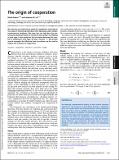The origin of cooperation
Author(s)
Koduri, Nihal; Lo, Andrew W
DownloadPublished version (3.735Mb)
Publisher Policy
Publisher Policy
Article is made available in accordance with the publisher's policy and may be subject to US copyright law. Please refer to the publisher's site for terms of use.
Terms of use
Metadata
Show full item recordAbstract
<jats:title>Significance</jats:title>
<jats:p>We develop a mathematical theory of how natural selection operates in the presence of interaction between replicating units. Our results show that with interaction, natural selection does more than seek to selfishly maximize fecundity. It also seeks to minimize correlation of fecundity between replicating units. We argue that correlation is a mechanism by which evolution can select for cooperation. This mechanism is distinct from standard biological explanations like kin selection, group selection, and reciprocity, and relies only on natural selection, and without recourse to notions of evolutionary stability.</jats:p>
Date issued
2021Department
Massachusetts Institute of Technology. Operations Research Center; Sloan School of ManagementJournal
Proceedings of the National Academy of Sciences of the United States of America
Publisher
Proceedings of the National Academy of Sciences
Citation
Koduri, Nihal and Lo, Andrew W. 2021. "The origin of cooperation." Proceedings of the National Academy of Sciences of the United States of America, 118 (26).
Version: Final published version